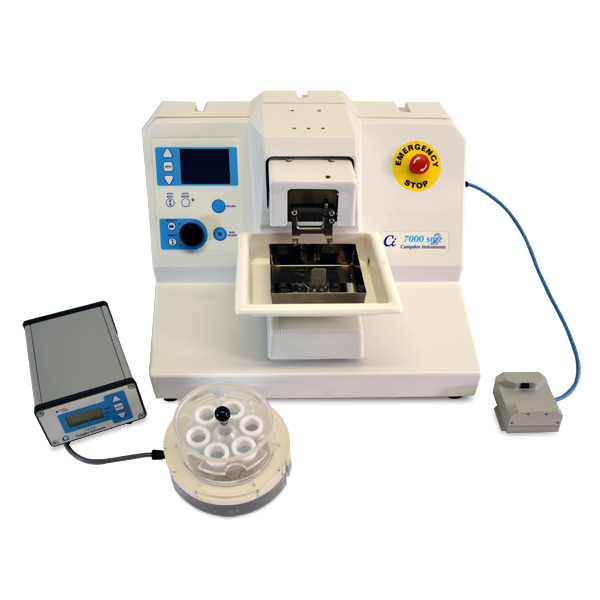
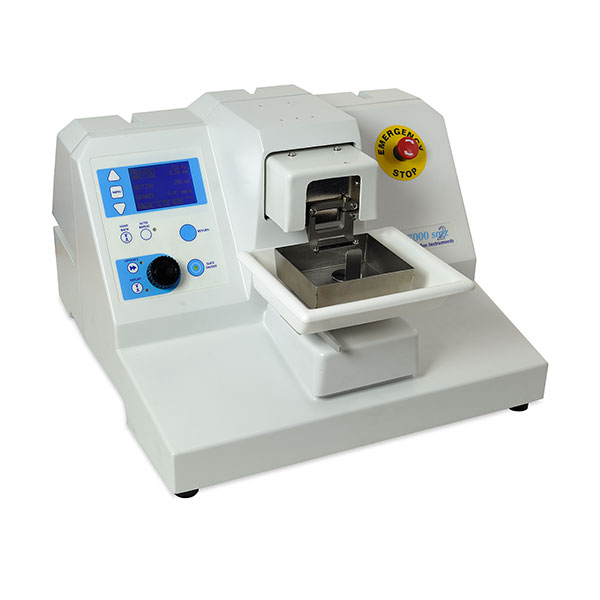
Our top of the range high precision, vibrating microtome ('vibrotome' for short, but often referred to as a 'vibratome'), this is the finest tissue slicer in the world for preparations for visual patch clamping or high resolution imaging. The 7000smz series Vibrating microtome has been the instrument of choice for many labs for 10 years - over 450 labs and counting! Using our microtomes, research detailing tissue slicing for visual patching of neurological tissue, heart, lung, and tissue scaffolds have all been published. The 7000smz-2 microtome represents significant advances with higher precision at a lower cost.
The effect of excessive Z-axis deflection on the health and viability of the tissue preparation has been much discussed since the publication of Geiger et al (2003) and the Campden 7000smz-2 tissue slicer, with ≤ 1µm Z-axis deflection across a wide range of vibration speeds and amplitudes, delivers healthy viable sections every time.
The vibrating mechanism of the 7000smz-2 vibrating microtome delivers unprecedented accuracy with nearly silent operation. Every machine is tested before dispatch by our in-house measurement devices and each machine is supplied with its own z-axis calibration checker.
The user interface is easy and versatile (with no foot switch unlike previous models) and offers simple operation at the push of a button or a range of changeable parameters for the expert user. The Campden 7000smz-2 also provides longevity of performance, as not only does the slicer give ≤ 1 µm performance out of the box, but the advance vibrating mechanism does not contain bearings and other elements subject to wear. Thus it will retain the ≤ 1 µm z-ad performance for many years, giving you consistency in your biological preparation, without the need for expensive servicing.
We have developed both ceramic and stainless-steel microtome blades, alongside the machine, so that the grinding and honing facets for the blade edge are matched to the blade downward angle of orientation to the tissue. The ceramic blades have a particular advantage when slicing brain tissue older than 30 days. These ceramic microtome blades also have a second advantage in that unlike stainless blades, these do not have to be replaced after each tissue sample.
Holding the tissue close to 4° C must continue throughout the slicing procedure. This can be done with passive cooling where a known amount of ice is used to maintain the cooled a.c.s.f. or with an electronically controlled thermo-electric Tissue Bath Cooler (7610A).
Other options include an LED cold light and magnifier or scope for clear observation whilst slicing. Shown with optional Slice incubation chamber and temperature controller.
Shown alongside the tissue slicer above, the Model 7470 Temperature-controlled Slice Holding Chamber was developed as an optional accessory to the Campden Instruments range of tissue slicers. They are designed to hold and maintain tissue slices in six sub-chambers at physiological temperatures with an aeration supply to allow recovery from slicing as well as incubation during the experimental day.
Dr. Gareth Morris (University of Manchester and University College London) talks about his research and how the use of Brain Slices provides an invaluable, in vitro research tool.
Dr Kate Connor from Trinity College Dublin talks about her research into the development of clinically relevant cancer models and the use of brain slices for model validation.
Specialized Ceramic blades for Campden Vibrating Microtomes. These blades are honed with a single bevel for superior slicing.
Specialized Blade Technology for Campden Vibrating Microtomes.
This chamber has been designed to hold and maintain tissue slices in six sub-chambers at physiological temperatures with an aeration supply to allow recovery from slicing as well as incubation during the experimental day.
Newly redesigned Bath Mount. Edge of the ice bath outer now has a rolled edge. Preventing vibration of the bath wall at certain harmonics of speed and amplitude, hence more stable, less splash, less evident vibration. Shown with standard and adjustable tissue mounts that can be ordered separately.
Temperature controlled cooling baths for the 7000smz-2, 5000mz-2, 5100-Plus and 5100mz vibrotomes with a controllable temperature range of approx +10ºC to 0ºC with accuracy of ± 1 ºC. For experiments where exact control of a low slicing temperature is required.
Physiological temperature controlled baths for the 7000smz-2, vibrotomes with a controllable temperature range of approx. +50 to +10ºC with accuracy of ± 1 ºC. For experiments utilising the technique of Huang S & Uusisaari MY (2013) where exact control of physiological slicing temperature is required.
To facilitate the careful slicing operation, it is most important that the progress of the blade through the tissue be clearly observed.
A magnifying glass for general global slices offering approximately 2x magnification.
A deluxe transit case with wheels and handles for a lab that may need to relocate the machine.
Wooden crate in treated wood to IPPC standards for international shipment.
| Section thickness step size: | 0.001 mm |
| Bath table rise & fall speed: | 1.0 mm/sec maximum |
| Maximum (vertical) travel of bath table: | 19 mm |
| Cutting head advance speed: | Minimum: -4.0 mm/sec (-1.00 during slicing) Maximum: +4.0 mm/sec (+1.00 during slicing) |
| Cutting head retraction speed: | 4.0 mm/sec |
| Maximum travel of cutting head: | 40 mm |
| Blade oscillation frequency: | Minimum: 50 Hz (lower frequenices available upon request) Maximum: 120 Hz (amplitude dependent) |
| Frequency step size: | 5 Hz |
| Blade oscillation amplitude | Minimum: 0.5 mm (nominal) Maximum: 2.5 mm (nominal) |
| Amplitude step size: | 0.25 mm (nominal) |
| Power requirements (Selectable): | 115VAC 60Hz, 230VAC 50Hz |
| Power rating: | 100W |
| Fuse rating | 115V: T2A 250VAC 230V: T2A 250VAC |
| Light source: | 100-240Vac 3W |
| Dimensions: | 410mm Width x 400mm Depth x 270mm Height (excluding light source and microscope) |
| Weight: | 33Kg |
| Boxed shipping weight: | 60Kg |
The new all-in-one chamber design incorporates the best features of both the old Haas or interface type cell and the old Oslo or submerged type cell.
The new all-in-one chamber design incorporates the best features of both the old Haas or interface type cell and the old Oslo or submerged type cell.
Consists of an aluminium heat exchanger plate heated by a thin heating element. The heat exchanger supplies concentric heat to the chamber itself and in-line heat to the incoming perfusate ensuring both are heated uniformly.
The new all-in-one chamber design incorporates the best features of both the old Haas or interface type cell and the old Oslo or submerged type cell.
The new all-in-one chamber design incorporates the best features of both the old Haas or interface type cell and the old Oslo or submerged type cell.
The new all-in-one chamber design incorporates the best features of both the old Haas or interface type cell and the old Oslo or submerged type cell.
The new all-in-one chamber design incorporates the best features of both the old Haas or interface type cell and the old Oslo or submerged type cell.
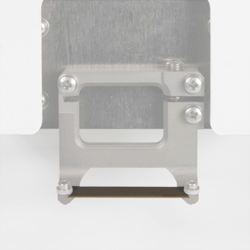
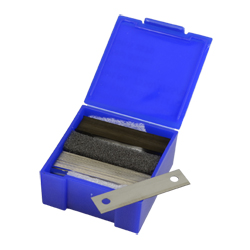

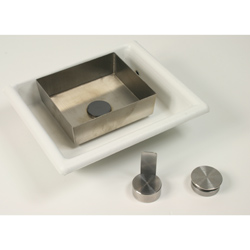






-250.jpg)
-250.jpg)

-250.jpg)
-1-250.jpg)
-1-250.jpg)
-250.jpg)